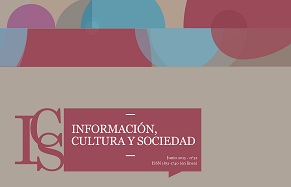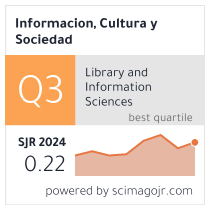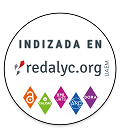The role of libraries in the socio-educational reintegration of adolescents deprived from freedom: Analysis of five libraries of Latin American juvenile detention centers
Abstract
This research analyzes the role of libraries in the socio-educational reintegration of adolescents deprived from freedom in four Latin American countries: Chile, Argentina, Colombia, and Mexico. The qualitative methodological approach is used, and semi-structured interviews are applied to the representatives of the selected institutions. Through a content analysis, the role and position of libraries in organizations that work with adolescents deprived from freedom are studied. In addition, the importance of interdisciplinary work is studied and specific roles and functions of libraries for the insertion and social empowerment of young people are disclosed. The promotion of basic social rights is evident in the proposal of activities and services and a difference in the experience that supports each information unit.Downloads
References
Andréu Abela, Jaime. 2001. Las técnicas de Análisis de Contenido: una revisión actualizada. Sevilla: Centro de Estudios Andaluces. <http://mastor.cl/blog/wp-content/uploads/2018/02/Andreu.-analisis-de-contenido.-34-pags-pdf.pdf> [Consulta: 20 enero 2023].
Buaiz Valera, Yuri Emilio. 2016. Análisis comparativo de la legislación nacional sobre justicia juvenil con la de otros países y revisión de experiencias latinoamericanas sobre programas de atención de adolescentes en conflicto con la ley penal entre 12 y 14 años. Caracas: UNICEF. <https://www.unicef.org/venezuela/media/606/file/An%C3%A1lisis%20comparativo%20de%20la%20legislaci%C3%B3n%20nacional%20sobre%20justicia%20juvenil%20con%20la%20de%20otros%20pa%C3%ADses%20y%20revisi%C3%B3n%20de%20experiencias%20latinoamericanas%20sobre%20programas%20de%20atenci%C3%B3n%20de%20adolescentes%20en%20conflicto%20con%20la%20ley%20penal%20entre%2012%20y%2014%20a%C3%B1os.pdf> [Consulta: 20 enero 2023].
Calvillo Bustamante, Adela. 2017. La delincuencia juvenil: sentencia condenatoria y programas de reinserción. Madrid: Universidad de Alcalá. 54 p. Tesis de Maestría. <http://hdl.handle.net/10017/31984> [Consulta: 20 enero 2023].
CEPAL. 2020. Panorama social de América Latina. LC/PUB.2021/2-P/Rev.1. Santiago: Naciones Unidas. <https://www.cepal.org/es/publicaciones/46687-panorama-social-america-latina-2020> [Consulta: 20 enero 2023].
CIDH. 2002. Opinión consultiva OC-17/2002 de 28 de agosto de 2002. <https://www.corteidh.or.cr/docs/opiniones/seriea_17_esp.pdf> [Consulta: 20 enero 2023].
Cillero, Miguel, Paula Margotta, Ester Valenzuela, Carlos Brideño y Natalia Bozo Carrillo. 2017. Situación educativa de las y los adolescentes privados de libertad por causas penales en América Latina y el Caribe. Panamá: UNICEF. <https://www.unicef.org/lac/media/671/file/Situaci%C3%B3n%20educativa%20de%20las%20y%20los%20adolescentes%20privados%20de%20libertad%20por%20causas%20penales%20en%20ALC.pdf> [Consulta: 20 enero 2023].
Consejo Ciudadano para la Seguridad Pública y la Justicia Penal. 2020. Ranking 2020 de las 50 ciudades más violentas del mundo. <https://geoenlace.net/seguridadjusticiaypaz/archivo/6469de_5297ebf528.pdf> [Consulta: 20 enero 2023].
De la Peña McCook, Kathleen. 2004. Public Libraries and People in Jail. En Reference and User Services Quarterly. Vol. 44, no. 1, 26-30.
García, Silvia. 2010. Estrategias para la reinserción social de jóvenes en conflicto con la ley. En Revista Estudios Sociales Contemporáneos. No. 4, 91–110. <https://bdigital.uncu.edu.ar/objetos_digitales/5565/garcia-rec4.pdf> [Consulta: 20 enero 2023].
Gilman, Issac. 2008. Beyond Books: Restorative Librarianship in Juvenile Detention Centers. En Public Libraries. Vol. 47, no.1, 59-66. <https://core.ac.uk/download/pdf/48842993.pdf> [Consulta: 20 enero 2023].
Krolak, Lisa. 2022. Una lectura más allá de las rejas: el potencial transformativo de las bibliotecas penitenciarias. Hamburgo: Instituto de la UNESCO para el Aprendizaje a lo Largo de Toda la Vida (UIL). <https://unesdoc.unesco.org/ark:/48223/pf0000380330> [Consulta: 20 enero 2023].
Lehmann, Vibeke y Joanne Locke. 2007. Pautas para servicios Bibliotecarios para reclusos. 3° edición. La Haya: IFLA. (IFLA Professional Reports: 99). <https://www.ifla.org/files/assets/hq/publications/professional-report/99.pdf> [Consulta: 20 enero 2023].
Meneses Tello, Felipe. 2008. Servicios bibliotecarios para grupos vulnerables: la perspectiva en las directrices de la IFLA y otras asociaciones. En Informação & Sociedade. Vol. 18, no.1, 45–66. <https://bdigital.uncuhttps://brapci.inf.br/_repositorio/2010/11/pdf_1b96767070_0012631.pdf.edu.ar/objetos_digitales/5565/garcia-rec4.pdf> [Consulta: 20 enero 2023].
Meneses Tello, Felipe. 2017. Información y bibliotecas en torno a los derechos humanos. En Revista Brasileira de Biblioteconomia e Documentação. Vol. 13, no. 2, 42-84. <https://brapci.inf.br/index.php/res/download/41855> [Consulta: 20 enero 2023].
OEA. 2012. Los sistemas de responsabilidad penal adolescente en las Américas. Montevideo: Instituto Interamericano del Niño, la Niña y Adolescentes (IIN).<http://www.iin.oea.org/pdf-iin/Sistemas_de_Responsabilidad_Penal_Adolescente.pdf> [Consulta: 20 enero 2023].
ONU. 1990. Reglas de las Naciones Unidas para la protección de los menores privados de libertad. <https://www.acnur.org/fileadmin/Documentos/BDL/2002/1423.pdf?file=fileadmin/Documentos/BDL/2002/1423> [Consulta: 20 enero 2023].
Palummo, Javier. 2014. Justicia penal juvenil. Situación y perspectivas en América Latina y el Caribe. Panamá: UNICEF. <http://observatoriojudicial.org.uy/wp-content/uploads/2019/04/UNICEF-Justicia-penal-juvenil-en-LAC.pdf> [Consulta: 20 enero 2023].
Vogel, Brenda. 2009. The Prison Library Primer: A Program for the Twenty-First Century. Lanham: Scarecrow Press.
Authors publishing in this journal acknowledge the conditions below:
- Authors retain the copyright of their work while they transfer the right of the first publishing to the journal, under the Creative Commons Attribution-ShareAlike 4.0 International (CC BY-SA 4.0) Licence, which allows third parties to reproduce them under the condition that express mention is given to the author and to its original publication in the journal.
- Authors may enter into other contractual and independent arrangements for the non-exclusive distribution of the version of the article published in this journal (for instance, it can be published in an institutional repository or in a book). In any case, an express mention should be given to its first publication in the journal.
- It is permitted and encouraged to publish online the articles (for example, on institutional or personal pages).


























